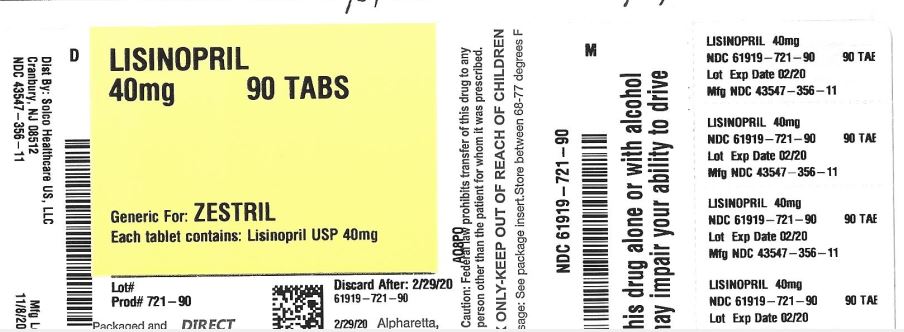It is a well known fact that breastfeeding is best source of nutrition for infants. Breast milk provides minerals, vitamins and antibodies in most acceptable format when they need it. Nutrition taken by mother passes to breast-milk and same thing applies to medicines taken by mothers. Not all drugs cause problem for baby but some do. Lets analyze if Lisinoril | Lisinopril Tablet is safe for baby while breastfed.
What is Lisinoril | Lisinopril Tablet used for?
1.1 Hypertension Lisinopril is indicated for the treatment of hypertension in adult patients and pediatric patients 6 years of age and older to lower blood pressure. Lowering blood pressure lowers the risk of fatal and non-fatal cardiovascular events, primarily strokes and myocardial infarctions. These benefits have been seen in controlled trials of antihypertensive drugs from a wide variety of pharmacologic classes. Control of high blood pressure should be part of comprehensive cardiovascular risk management, including, as appropriate, lipid control, diabetes management, antithrombotic therapy, smoking cessation, exercise, and limited sodium intake. Many patients will require more than 1 drug to achieve blood pressure goals. For specific advice on goals and management, see published guidelines, such as those of the National High Blood Pressure Education Program’s Joint National Committee on Prevention, Detection, Evaluation, and Treatment of High Blood Pressure (JNC). Numerous antihypertensive drugs, from a variety of pharmacologic classes and with different mechanisms of action, have been shown in randomized controlled trials to reduce cardiovascular morbidity and mortality, and it can be concluded that it is blood pressure reduction, and not some other pharmacologic property of the drugs, that is largely responsible for those benefits. The largest and most consistent cardiovascular outcome benefit has been a reduction in the risk of stroke, but reductions in myocardial infarction and cardiovascular mortality also have been seen regularly. Elevated systolic or diastolic pressure causes increased cardiovascular risk, and the absolute risk increase per mmHg is greater at higher blood pressures, so that even modest reductions of severe hypertension can provide substantial benefit. Relative risk reduction from blood pressure reduction is similar across populations with varying absolute risk, so the absolute benefit is greater in patients who are at higher risk independent of their hypertension (for example, patients with diabetes or hyperlipidemia), and such patients would be expected to benefit from more aggressive treatment to a lower blood pressure goal. Some antihypertensive drugs have smaller blood pressure effects (as monotherapy) in black patients, and many antihypertensive drugs have additional approved indications and effects (e.g., on angina, heart failure, or diabetic kidney disease). These considerations may guide selection of therapy. Lisinopril may be administered alone or with other antihypertensive agents [see Clinical Studies (14.1)]. 1.2 Heart Failure Lisinopril is indicated to reduce signs and symptoms of systolic heart failure [see Clinical Studies (14.2)]. 1.3 Reduction of Mortality in Acute Myocardial Infarction Lisinopril is indicated for the reduction of mortality in treatment of hemodynamically stable patients within 24 hours of acute myocardial infarction. Patients should receive, as appropriate, the standard recommended treatments such as thrombolytics, aspirin and beta-blockers [see Clinical Studies (14.3)].
I am breastfeeding mother and I am using Lisinoril | Lisinopril Tablet. Can it have any bad effect on my kid? Shall I search for better alternative?
Lisinoril | Lisinopril Tablet contains only one active ingredient that is Lisinopril. We have analyzed the usage of Lisinopril in breastfeeding and our analysis suggest that Lisinopril poses Low risk for infant while breastfeeding and hence Lisinoril | Lisinopril Tablet itself shall be considered Low risk item for breastfeeding.
Lisinoril | Lisinopril Tablet Breastfeeding Analsys
Low RiskCAS Number: 76547-98-3
Higher caution on early neonatal period is required. Check-up for blood hypotension and muscular hypotonia.
Lisinoril | Lisinopril Tablet Breastfeeding Analsys - 2
CAS Number: 83915-83-7
Because no information is available on the use of lisinopril during breastfeeding, an alternate drug may be preferred, especially while nursing a newborn or preterm infant.
What should I do if already breastfed my kid after using Lisinoril | Lisinopril Tablet?
Lisinoril | Lisinopril Tablet is in the category of low risk, if you have already used it then its not a big deal if health and behavior of baby is good. However your health care provider shall be aware of the fact that you have used Lisinoril | Lisinopril Tablet so you should inform him based on your convenience.
I am nursing mother and my doctor has suggested me to use Lisinoril | Lisinopril Tablet, is it safe?
Though Lisinoril | Lisinopril Tablet dose not comes in category of safe drugs rather it comes in category of low risk but if your doctor is aware that you are breastfeeding your baby and has still recommended it then its advantages must be outweighing the risks.
If I am using Lisinoril | Lisinopril Tablet, will my baby need extra monitoring?
Not much monitoring required while using Lisinoril | Lisinopril Tablet
Who can I talk to if I have questions about usage of Lisinoril | Lisinopril Tablet in breastfeeding?
US
National Womens Health and Breastfeeding Helpline: 800-994-9662 (TDD 888-220-5446) 9 a.m. and 6 p.m. ET, Monday through Friday
UK
National Breastfeeding Helpline: 0300-100-0212 9.30am to 9.30pm, daily
Association of Breastfeeding Mothers: 0300-330-5453
La Leche League: 0345-120-2918
The Breastfeeding Network supporter line in Bengali and Sylheti: 0300-456-2421
National Childbirth Trust (NCT): 0300-330-0700
Australia
National Breastfeeding Helpline: 1800-686-268 24 hours a day, 7 days a week
Canada
Telehealth Ontario for breastfeeding: 1-866-797-0000 24 hours a day, 7 days a week
Drug Brands with same Active ingredients


